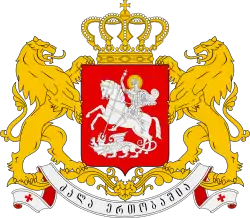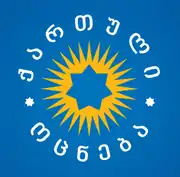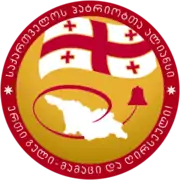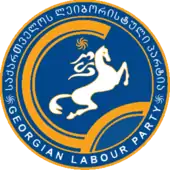2014 Georgian local elections
The Georgian local self-government election, 2014, (Georgian: საქართველოს ადგილობრივი თვითმმართველობის ორგანოების არჩევნები) was held on June 15, 2014, to elect the councils of local government, sakrebulo, and the Mayor of Tbilisi, the capital of Georgia.
| |||||||||||||||||||||||||||||||||||||
Background
 |
|---|
| This article is part of a series on the politics and government of Georgia |
|
|
The previous local election in Georgia was held in May 2010 and resulted in the overwhelming victory of the United National Movement (UNM) party, chaired by then-President of Georgia Mikheil Saakashvili. The 2014 election was held in a changed political climate as the UNM lost its position of a ruling party to Bidzina Ivanishvili-led Georgian Dream coalition in the parliamentary election of 2012 and Saakashvili's second and final presidential term expired in 2013. After the Georgian Dream's accession to power, the bodies of local government became political battlegrounds and many members of the local councils abandoned the UNM.[1] Both the UNM leadership and political analysts saw the local elections of 2014 as a chance for the UNM to stage a political comeback.[2][3]
Results

In the Tbilisi mayoral election, the candidate of the Georgian Dream coalition, David Narmania, received 46.13%, Nika Melia of the United National Movement received 27.91%, Dimitri Lortkipanidze of the Nino Burjanadze - United Opposition coalition received 12.82%, and Irma Inashvili of the Alliance of Patriots Georgia received 5.37%.[4][5][6] Because no candidate received more than 50% of the vote a runoff was held on June 28.
In the Tbilisi city council elections the Georgian Dream coalition received 45.92%, the United National Movement received 26.18%, the Nino Burjanadze - United Opposition coalition received 10.51%, and the Alliance of Patriots of Georgia received 6.3%. No other party crossed the 4% barrier to win representation.[4]
Nationally, Georgian Dream received 51%, United National Movement received 22%, the Nino Burjanadze - United Opposition coalition received 10%, and the Alliance of Patriots of Georgia received 4.72%.[5][6]
References
- Corso, Molly (December 26, 2012). "Georgia: Political Tumult Hits Regions". EurasiaNet's Weekly Digest. Retrieved 30 June 2013.
- Corso, Molly (February 7, 2013). "A potential split in Georgian Dream gives Saakashvili's party hope". Business New Europe. Archived from the original on 10 February 2013. Retrieved 30 June 2013.
- Whitmore, Brian (April 28, 2013). "Saakashvili's National Movement Fights To Escape Political Wilderness". Radio Free Europe/Radio Liberty. Retrieved 30 June 2013.
- Georgian CEC announces preliminary results of municipal election in Tbilisi Trend.az. 17 June 2014. Accessed 21 June 2014
- Local Elections: GD leads but run-off votes will be held Archived 2014-06-20 at the Wayback Machine Georgia Today. 21 June 2014. Accessed 21 June 2014.
- Local Elections Boost Alliance of Patriots' Ambitions for Parliamentary Polls Archived 2016-10-11 at WebCite Civil Georgia. 21 June 2014. Accessed 21 June 2014




